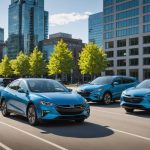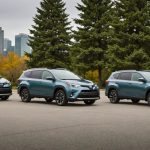When choosing between gas, hybrid, and electric cars in Canada for 2026, you’ll want to weigh practical refueling access, upfront cost, and long-term savings. Gasoline models like the Honda Civic remain reliable and easy to refuel, while hybrids deliver impressive fuel savings, reduced maintenance, and government incentives. Electric vehicles top the charts for efficiency, performance, and environmental benefits, especially with better charging infrastructure. If you’re ready to compare models, efficiency, and costs in detail, the insights ahead will help.
Top Gasoline Cars in Canada 2026: Models, Costs, and Performance Analysis
If you’re considering a new vehicle in 2026, gasoline-powered cars remain a practical choice for many Canadian drivers, thanks to their established reliability, widespread fueling infrastructure, and often lower upfront costs compared to hybrids and electrics.
You’ll find models like the Honda Civic, Toyota Corolla, and Ford F-150 consistently delivering on performance and value. Gasoline vehicles are straightforward to refuel, making them ideal if you frequently travel or serve in remote areas.
However, keep an eye on evolving fuel tax policies, as governments may adjust these to encourage cleaner alternatives. While charging infrastructure expansion is rapidly improving for electric cars, gas stations remain far more accessible nationwide.
Choose a gasoline vehicle if you prioritize proven dependability, immediate refueling, and lower initial investment when serving clients or your community.
Leading Hybrid Cars 2026: Fuel Savings, Maintenance, and Ownership Costs
While gas-powered vehicles continue to hold their ground, hybrid cars in 2026 present an attractive alternative for Canadian drivers who want to balance fuel efficiency with practicality. If you’re committed to serving your community and reducing your environmental footprint, hybrids offer several benefits.
Advanced battery technology ensures longer lifespans and reduced replacement costs. You’ll also find that government incentives can lower your upfront investment, making ownership more accessible.
Improved battery life and government incentives make hybrid car ownership more affordable and worry-free than ever before.
When you evaluate leading hybrid models, consider these key factors:
- Fuel savings: Hybrids typically deliver 30-50% better fuel economy than conventional vehicles.
- Maintenance: With fewer moving parts and regenerative braking, hybrids often require less servicing.
- Battery technology: Modern batteries are more reliable and come with extended warranties.
- Government incentives: Rebates and tax credits further reduce your total cost of ownership.
Best Electric Cars 2026: Efficiency, Performance, and Long-Term Value
Although the automotive landscape in Canada is rapidly evolving, electric cars in 2026 stand out for their remarkable efficiency, advanced performance, and compelling long-term value. If you’re committed to serving your community and the environment, you’ll appreciate how next-generation battery technology delivers longer ranges and faster charging.
Advances in lithium-ion and emerging solid-state batteries mean you can travel further between charges, confidently meeting daily needs or volunteer trips. Improved charging infrastructure across Canadian cities and highways ensures convenient access, reducing downtime and supporting your reliability.
Electric vehicles now offer instant torque, smooth acceleration, and lower maintenance than traditional cars. Choosing an electric vehicle isn’t just a smart investment—it’s a step toward a cleaner, more dependable transportation future for those you help every day.
Frequently Asked Questions
How Do Government Incentives Differ for Gas, Hybrid, and Electric Cars in Canada?
You’ll notice government grants and tax credits in Canada primarily target electric and plug-in hybrid vehicles, not traditional gas-powered cars.
If you choose an electric or plug-in hybrid model, you can access federal incentives like the iZEV Program, plus provincial rebates in some areas.
Gas vehicles don’t qualify for these benefits, so if you want to maximize savings and support environmental stewardship, consider electrified options for the best access to financial incentives.
What Are the Resale Values of Gas, Hybrid, and Electric Cars After Five Years?
You’ll notice gas cars typically experience higher resale depreciation after five years due to shifting market demand and advancing technology.
Hybrid vehicles generally hold value better, as buyers appreciate their fuel efficiency and reliability.
Electric cars often face the steepest initial depreciation, mainly because of rapid battery advancements and concerns about replacement costs.
If you aim to serve others through informed recommendations, prioritize hybrids or newer EVs with proven battery longevity for ideal resale value.
How Does Cold Canadian Weather Affect Battery Performance in Hybrids and EVS?
You’ll notice battery cold weather challenges in both hybrids and EVs during Canadian winters. Low temperatures slow chemical reactions in batteries, reducing driving range and charging efficiency.
Winter driving effects can also increase energy demand for heating, further limiting range. To serve others reliably, pre-condition your vehicle while plugged in, use thermal management features, and plan routes with available charging stations.
These steps help maintain desirable performance and guarantee dependable transportation in cold climates.
Are Insurance Rates Different for Gas, Hybrid, and Electric Vehicles in Canada?
You’ll notice insurance premiums often differ among gas, hybrid, and electric vehicles in Canada. Cost variations arise due to factors like vehicle repair expenses, replacement parts, and specialized technology in hybrids and EVs.
If you’re assisting clients or community members, advise them to compare quotes, as some insurers offer green vehicle discounts. Always assess the total cost of ownership, because while hybrids and EVs may save on fuel, insurance could be higher.
What Is the Environmental Impact of Producing Each Powertrain Type?
When you peel back the layers, you’ll see each powertrain’s environmental impact varies. Gas vehicles create high manufacturing emissions and ongoing tailpipe pollution.
Hybrids offer reduced emissions but still depend on fossil fuels.
Electric vehicles shift emissions to battery production, which is energy-intensive, but they eliminate tailpipe emissions.
You should consider battery recycling’s growing importance, as it reduces resource extraction and waste, making EVs increasingly sustainable for those seeking to serve the planet responsibly.
Conclusion
When choosing your 2026 powertrain in Canada, think of it as selecting the right tool for the job. Gas cars offer familiarity and range, hybrids blend efficiency with flexibility, and electrics promise lower running costs and future-ready technology. Consider your driving habits, budget, and long-term goals. Each option has distinct strengths, so weigh the facts carefully. By understanding each system’s advantages, you’ll steer confidently toward the vehicle that best fits your needs and priorities.
Stephen Johns is the founder of CarleaseCanada.ca A website that allows families to travel inexpensive or free. In 2014, when he was faced with an expense-intensive Lake Tahoe extended family reunion He embarked on his first adventure in the world of rewards on credit cards. The following summer, using a handful of carefully-planned credit card applications, he had used 15000 Ottawa Rapid Rewards points to pay for eight tickets to cross-country flights. He founded Points With a Crew to assist others to realize that due to rewards from credit cards your next family trip could be closer than they thought.









